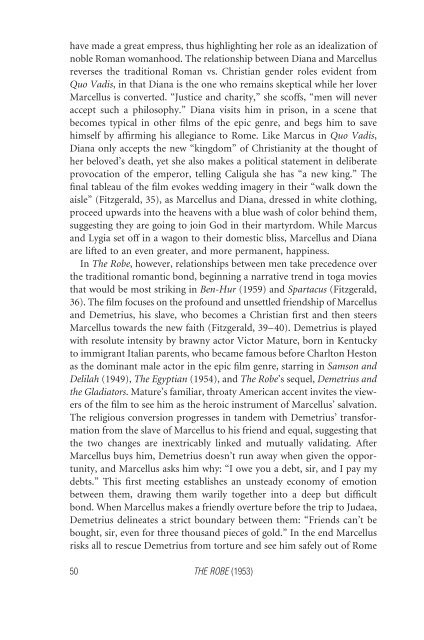Big Screen Rome - Amazon Web Services
Big Screen Rome - Amazon Web Services
Big Screen Rome - Amazon Web Services
You also want an ePaper? Increase the reach of your titles
YUMPU automatically turns print PDFs into web optimized ePapers that Google loves.
have made a great empress, thus highlighting her role as an idealization of<br />
noble Roman womanhood. The relationship between Diana and Marcellus<br />
reverses the traditional Roman vs. Christian gender roles evident from<br />
Quo Vadis, in that Diana is the one who remains skeptical while her lover<br />
Marcellus is converted. “Justice and charity,” she scoffs, “men will never<br />
accept such a philosophy.” Diana visits him in prison, in a scene that<br />
becomes typical in other films of the epic genre, and begs him to save<br />
himself by affirming his allegiance to <strong>Rome</strong>. Like Marcus in Quo Vadis,<br />
Diana only accepts the new “kingdom” of Christianity at the thought of<br />
her beloved’s death, yet she also makes a political statement in deliberate<br />
provocation of the emperor, telling Caligula she has “a new king.” The<br />
final tableau of the film evokes wedding imagery in their “walk down the<br />
aisle” (Fitzgerald, 35), as Marcellus and Diana, dressed in white clothing,<br />
proceed upwards into the heavens with a blue wash of color behind them,<br />
suggesting they are going to join God in their martyrdom. While Marcus<br />
and Lygia set off in a wagon to their domestic bliss, Marcellus and Diana<br />
are lifted to an even greater, and more permanent, happiness.<br />
In The Robe, however, relationships between men take precedence over<br />
the traditional romantic bond, beginning a narrative trend in toga movies<br />
that would be most striking in Ben-Hur (1959) and Spartacus (Fitzgerald,<br />
36). The film focuses on the profound and unsettled friendship of Marcellus<br />
and Demetrius, his slave, who becomes a Christian first and then steers<br />
Marcellus towards the new faith (Fitzgerald, 39–40). Demetrius is played<br />
with resolute intensity by brawny actor Victor Mature, born in Kentucky<br />
to immigrant Italian parents, who became famous before Charlton Heston<br />
as the dominant male actor in the epic film genre, starring in Samson and<br />
Delilah (1949), The Egyptian (1954), and The Robe’s sequel, Demetrius and<br />
the Gladiators. Mature’s familiar, throaty American accent invites the viewers<br />
of the film to see him as the heroic instrument of Marcellus’ salvation.<br />
The religious conversion progresses in tandem with Demetrius’ transformation<br />
from the slave of Marcellus to his friend and equal, suggesting that<br />
the two changes are inextricably linked and mutually validating. After<br />
Marcellus buys him, Demetrius doesn’t run away when given the opportunity,<br />
and Marcellus asks him why: “I owe you a debt, sir, and I pay my<br />
debts.” This first meeting establishes an unsteady economy of emotion<br />
between them, drawing them warily together into a deep but difficult<br />
bond. When Marcellus makes a friendly overture before the trip to Judaea,<br />
Demetrius delineates a strict boundary between them: “Friends can’t be<br />
bought, sir, even for three thousand pieces of gold.” In the end Marcellus<br />
risks all to rescue Demetrius from torture and see him safely out of <strong>Rome</strong><br />
50 THE ROBE (1953)



